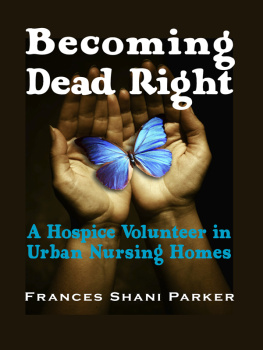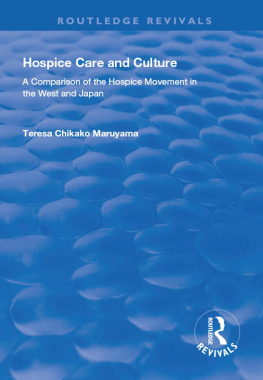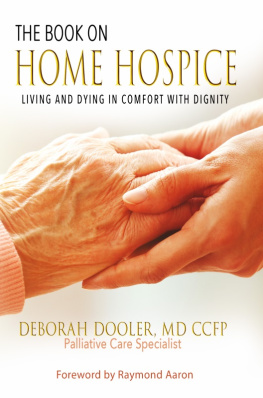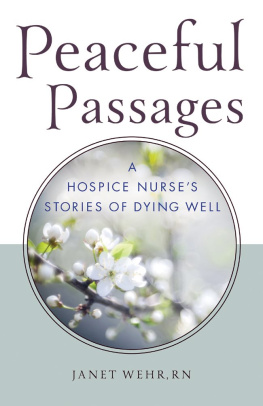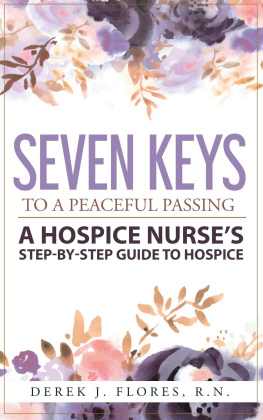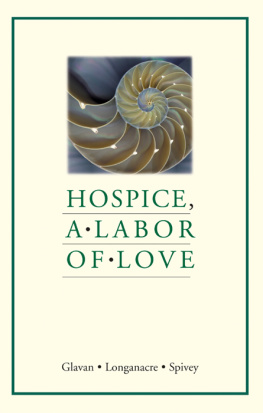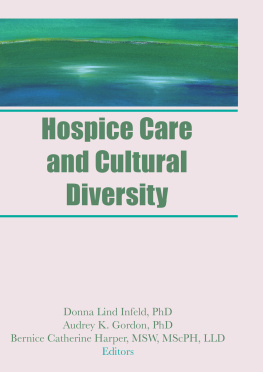Becoming Dead Right
A Hospice Volunteer in Urban Nursing Homes
Frances Shani Parker
Becoming Dead Right: A Hospice Volunteer in Urban Nursing Homes
Copyright 2007 Frances Shani Parker. All Rights Reserved.
No part of this publication may be reproduced, transmitted in any form or by any means, electronic, mechanical, photocopying, recording, or otherwise, or stored in a retrieval system, without the prior written consent of the publisher.
First Edition: September 2007
Library of Congress Cataloging-in-Publication Data
Parker, Frances Shani, 1945
Becoming dead right : a hospice volunteer in urban nursing homes / Frances Shani Parker. -- 1st ed.
p. cm.
Includes bibliographical references and index.
ISBN-13: 978-1-932690-35-4 (pbk. : alk. paper)
ISBN-10: 1-932690-35-2 (pbk. : alk. paper)
1. Hospice care--Michigan--Detroit--Anecdotes. 2. Terminal care--Michigan--Detroit--Anecdotes. 3. Palliative treatment--Michigan--Detroit--Anecdotes. 4. Parker, Frances Shani, 1945- 5. Volunteer workers in terminal care--Michigan--Detroit--Anecdotes. I. Title.
R726.8.P3556 2007
362.17'5609774--dc22
2007011692
Distributed by:
Baker & Taylor, Ingram Book Group, New Leaf Distributing

Published by:
Loving Healing Press
5145 Pontiac Trail
Ann Arbor, MI 48105
USA
http://www.LovingHealing.com or
Fax +1 734 663 6861
Loving Healing Press
Praise for
Becoming Dead Right
Parker gently leads us to examine the serious and undiscussed topic of death in this country by focusing on the lives of Gail, Crosby, Bea, and others who teach us that the end of our lives can be meaningful. This book is filled with poetry, stories, wisdom, and common sense that can help boomers, students, caregivers, and policy makers understand their own aging and realize that our society canand shouldmake important changes that can ensure safe, dignified, individualized care at the end of our lives.
Alice H. Hedt, Executive Director
National Citizens Coalition for Nursing Home Reform
Washington, DC
Becoming Dead Right gives us a blueprint for how we should approach dying and death. The author, through her impelling personal experiences as a hospice volunteer and her descriptive details of how each individual claims death, enfolds the reader into the many short stories that make us understand what hospice is all about.
Karyne Jones, President and CEO
National Caucus and Center on Black Aged, Inc.
Washington, DC
Before I read this book, I knew very little about hospice care. Reading this book was extremely enlightening. It is so interesting and well written that I could hardly put it down. While maintaining universal appeal, perspectives of people of color are emphasized. I highly recommend this book as a must read for every individual who has ever experienced the illness and death of a loved one or who ever will. That includes everyone.
Naomi Long Madgett, Ph.D.
Poet Laureate of the City of Detroit, Michigan
There is no better description of cross-generational bonding and mutual learning than is found in Becoming Dead Right. Parker opens an amazing door of possibility with her lucid description of the loving intersects between students and nursing home residents. Drawing deeply from her own vivid experiences with elders in her family, Ms. Parker makes the case for more formal attachments between schools and nursing homes, using the emergent pedagogy of service learning.
James C. Kielsmeier Ph.D., President
National Youth Leadership Council
Saint Paul, MN
Ms. Parker leans on her years as educator and hospice volunteer to challenge us to look beyond stereotypes that pigeonhole our beliefs about what the elderly and the young can do when given the opportunity. For many, this door of opportunity is opened by service-learning, a teaching and learning method that engages young people in solving problems within their schools and communities, as part of their academic studies or other intentional learning activities. Ms. Parkers book is a blueprint for action and an example of compassion that I hope many will read and also follow.
Nelda Brown, Executive Director
National Service-Learning Partnership at the Academy for Educational Development
Washington, DC
The author, an inner-city hospice volunteer, pits her humanity against the neglect, shame, guilt, and fear that death and terminal illness provoke in modern urbanites. She weaves the invaluable lessons that she had gleaned from her vast experience with loving but unflinching sketches of her charges, her own poetry, and scathing, compelling dialogs. It is an incredible read, suffused with the surrealism that is an inevitable part of daily life in slums and housing projects, hospitals and care centers.
Sam Vaknin, PhD, author Malignant Self-Love
Poems
To rainbow smiles for everyone
on both sides of Through
Foreword
In his book, Time of Our Lives: The Science of Human Aging, Tom Kirkwood examines the biology of aging and notes that death is unfamiliar to so many young-adult and middle-aged individuals. Whereas in the 1880s only 74% of children born reached the age of 5, now over 99% do. Even at age 45, 96% of those born will survive to that age compared to barely over 50% in the 1880s. Thus, death is unfamiliar, uncomfortable, and increasingly a taboo topic. The dying are invisible to us, as they are mostly engaged in the dying process in hospitals or other institutions. Frances Shani Parker makes death and the dying a vivid part of life in her book Becoming Dead Right: A Hospice Volunteer in Urban Nursing Homes.
Ms. Parker describes the beginning of her journey into the world of hospice in the early chapters, engaging us in stories about men she knew who had HIV/AIDS and were dying. Her writing is excellent, and we see these men as whole individuals and not just as people dying. Ms. Parker brings her extraordinary gift of being able to see the many aspects of a person even when often these are covered up by pain, disease, or dementia. Section 1 of the book contains many stories of people and her experiences with them in nursing home settings. Ms. Parker astutely observes the challenges of nursing home staff as well and eloquently writes some of their stories. Ultimately, though, we are treated in this first section to Ms. Parkers love and compassion for those she serves and her humility in serving them. Her writing is tinged with profound respect for the individuals she worked with and helped. Each chapter closes with her lessons learned and her own poetry, much of which is compelling.
In part two, Ms. Parker broadens her book and gives advice and resources for the problems of caregiving, funerals, bereavement, hospice, and her dream for the future: Baby Boomer Haven. This part of the book is full of useful guides and facts, which will benefit all people caring for a loved one.
Ms. Parker was a school principal by profession. That title conjures up images of authority and power. It is thus striking that this book brings the stories of urban elders to the fore. Poverty, which so often makes people invisible, is not ignored here, but the stories of the human struggle, fear, kindnesses, and hopes predominate. This may be Ms. Parkers greatest gift to her readers: bringing to life people and events that are indeed so often invisible. This book is truly a gift. The writing is eloquent and powerful, and the stories are instructive and lasting. After finishing this book, I wanted to do more for other individuals who are dying, for as Ms. Parker so clearly imparts, the dying teach us so much about living well.

